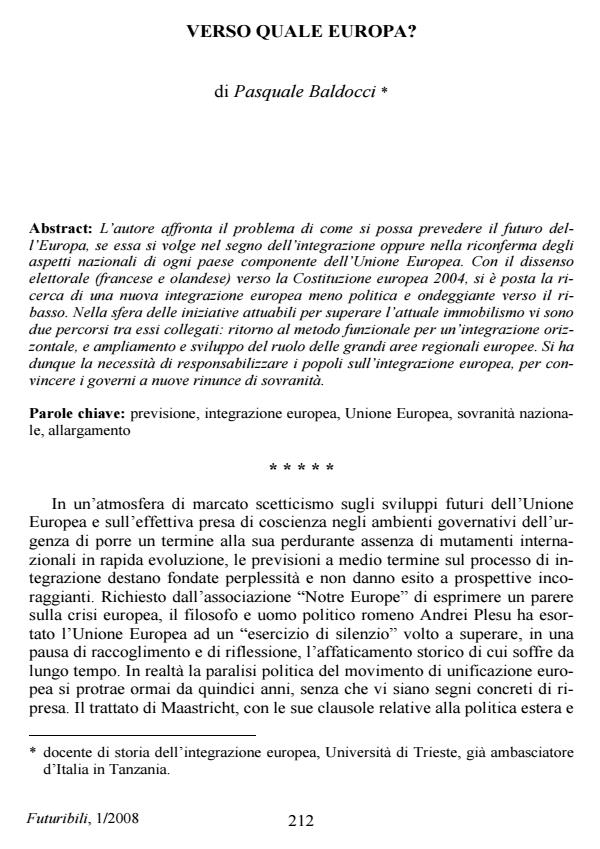Verso quale Europa?
Titolo Rivista FUTURIBILI
Autori/Curatori Pasquale Baldocci
Anno di pubblicazione 2009 Fascicolo 2008/1 Lingua Italiano
Numero pagine 6 P. 212-217 Dimensione file 32 KB
DOI 10.3280/FU2008-001014
Il DOI è il codice a barre della proprietà intellettuale: per saperne di più
clicca qui
Qui sotto puoi vedere in anteprima la prima pagina di questo articolo.
Se questo articolo ti interessa, lo puoi acquistare (e scaricare in formato pdf) seguendo le facili indicazioni per acquistare il download credit. Acquista Download Credits per scaricare questo Articolo in formato PDF

FrancoAngeli è membro della Publishers International Linking Association, Inc (PILA)associazione indipendente e non profit per facilitare (attraverso i servizi tecnologici implementati da CrossRef.org) l’accesso degli studiosi ai contenuti digitali nelle pubblicazioni professionali e scientifiche
Towards what Europe? - The author examines the question of how the future of Europe can be foreseen, whether it is moving towards integration or towards a reassertion of the national features of all EU member states. The French and Dutch rejection of the European Constitution in 2004 triggered a search for a lower-key, less political form of European integration. Possible initiatives to break out of the current state of immobility include two interconnected paths: one is a return to the functional method for horizontal integration and the other is a development and broadening of Europe’s big regional areas. The need therefore arises to give people a sense of responsibility for European integration in order to convince governments to relinquish more of their sovereignty. Reconstructing the European Union meaning and reality, by Myrianne Coen The fall of the Berlin Wall has thrown a stark light on the loss of reference points for Europeans: those of good and evil - values, of their territory and their interests. Religion is discredited, technology has no conscience. In this context there is a reawakening of ethics. But now the question arises as to the values on which this ethics is to be based, its deep meaning. The history of our civilisation shows that such values have always been rooted in the survival of the species, which implies protection of the individual. Nowadays they are expressed in respect for human (individual) rights and the primacy given to the democratic system applied to a society conceived as a "significant space of exchange". Managing change in complete security is therefore a question of evaluating policies, taking the individual as a benchmark according to an interpretation which has the survival of the species as a temporal limit and the respective territories of individual freedom as a spatial limit. All of this has to take account of reality, assuring a dialectic management between the dynamics of what we are able to do and the meaning which tells us what it is permissible to do. Devising management structures able to reconcile security and change should thus take account of everything that is effective and ethical. Conducting a suitable policy - the necessary condition for effectiveness - entails taking account of reality as it is in such a way that it may be modified (the dynamics of the possible) while respecting others in (individual) space and time (future generations). On the basis of these criteria it is therefore a question of determining, in the light of reality and principles, the meaning that emanates from democratic decisions, of considering the significant spaces that the meaning covers and of structuring them so that they encompass mutual relations. The individual is placed in this context as a benchmark by which the planet should measure itself, and the planet in turn should be considered "for mankind", since it is mankind who gives it a meaning.;
Pasquale Baldocci, Verso quale Europa? in "FUTURIBILI" 1/2008, pp 212-217, DOI: 10.3280/FU2008-001014